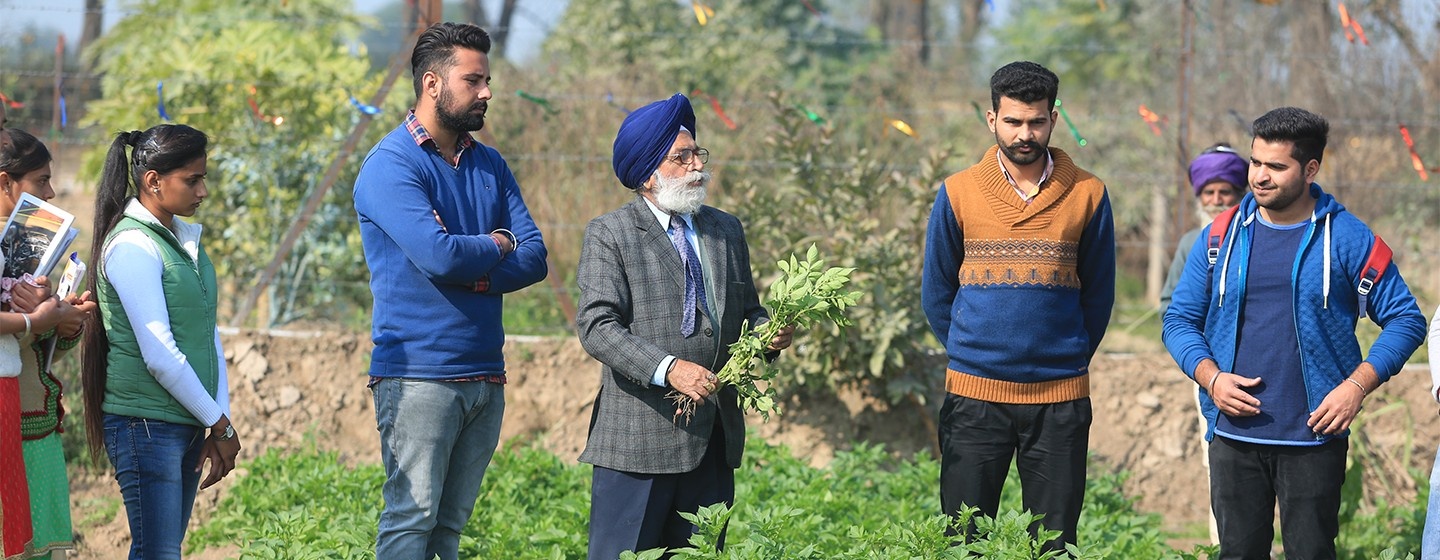Bachelor of Science in Agriculture (Hons.)
Graduate
4 Years

B.Tech in Civil Engineering deals with the Development, Design,
Construction, and Management of Infrastructure.
About the Programme
The Bachelor of Science in Agriculture (Hons.) at Guru Kashi University is a comprehensive undergraduate program that combines scientific knowledge, practical training, and modern agricultural innovations. The program emphasizes sustainable farming practices, crop production, soil science, plant breeding, biotechnology, agribusiness management, and environmental conservation.
At Guru Kashi University, students benefit from a blend of classroom learning, laboratory research, and extensive fieldwork that prepares them to address real-world agricultural challenges. The program also fosters innovation and entrepreneurial skills, enabling graduates to build successful careers in agronomy, agri-technology, food security, research, and rural development.
By choosing this program at Guru Kashi University, students are empowered to contribute to sustainable agriculture, strengthen global food security, and drive positive change in rural and environmental development.

Eligibility Criteria
Pass with 50% Aggregate Marks in 10+2
To be eligible for admission, candidates must have successfully completed the 10+2 Science examination with PCB, PCBM, PCM, or 10+2 in Agriculture, securing not less than 50% marks in aggregate. Alternatively, candidates who have completed a 2- or 3-year Diploma in Agriculture or its allied fields after 10th, with at least 50% aggregate marks, are also eligible to apply.
Program Outcomes
On Successful Completion of the program, the graduates of Bachelor of Science in Agriculture (Hons.) program will be able to:
Agricultural Knowledge
Apply the principles of agricultural sciences, biology, chemistry, and environmental studies to address challenges in sustainable farming, crop production, and resource management.
Problem Analysis
Identify, analyze, and interpret agricultural problems using scientific methods and evidence-based practices to develop effective and sustainable solutions.
Design and Development of Solutions
Design and implement innovative farming practices, crop systems, and agri-technologies that enhance productivity while considering environmental, economic, and social sustainability.
Modern Tool Usage
Select and apply modern agricultural tools, ICT applications, and data-driven technologies for precision farming, agribusiness, and farm management.
Research and Investigations
Use research methods, field trials, and laboratory techniques to collect, analyze, and interpret agricultural data for informed decision-making and innovation.
Agriculture and Society
Apply agricultural knowledge to improve food security, rural development, and environmental conservation while addressing societal and ethical responsibilities.
Environment and Sustainability
Understand the impact of agricultural practices on ecosystems and promote strategies that support biodiversity, soil health, water conservation, and climate resilience.
Communication and Extension Skills
Communicate effectively with farmers, agribusiness stakeholders, and communities, and transfer knowledge through extension services and outreach programs.
Entrepreneurship and Agribusiness
Develop entrepreneurial skills to establish and manage agri-startups, cooperatives, and agribusiness ventures contributing to economic growth and rural empowerment.
Lifelong Learning
Recognize the need for continuous learning to keep pace with advancements in agricultural science, technology, and global food systems.
Programme Educational Objectives (PEO)
01
Graduates will acquire strong foundational knowledge in agricultural sciences, applied biology, and environmental studies, enabling them to pursue higher education, competitive examinations, and advanced research in agriculture and allied fields.
02
Graduates will apply scientific and technological skills to develop sustainable, innovative, and economically viable agricultural practices that address food security, resource management, and environmental challenges while upholding ethical and professional values.
03
Graduates will grow personally and professionally by developing leadership, communication, and entrepreneurial abilities, preparing themselves to take up diverse roles in agribusiness, government organizations, research institutes, and rural development sectors.
04
Graduates will contribute to society by promoting sustainable farming, rural empowerment, and agri-entrepreneurship, while continuously enhancing their knowledge through lifelong learning, research, and professional networking at national and global levels.
ON THIS PAGE
Career path you can
choose after the course
- Agricultural Officer
- Agriculture Development Officer (ADO)
- Rural Development Officer
- Food Safety Officer
- Quality Control Officer
- Banking & Insurance (Agriculture Specialist Officer)
- Research Scientist
- Teaching / Academic Careers
- M.Sc. Agriculture (various specializations)
- MBA in Agribusiness Management
- Agri-Biotech Companies
- Agrochemical & Fertilizer Companies
- Food Processing Industry
- Agri-Tech Startups
- Export & Import Houses
- Agri-Entrepreneur
- Agri-Business Owner
- Food Processing Units
- Agri-Consultancy / Extension Services
- International Opportunities (FAO, UNDP, World Bank, etc.)






 Download Prospectus
Download Prospectus
 info@gku.ac.in
info@gku.ac.in
 +91-99142-83400
+91-99142-83400








